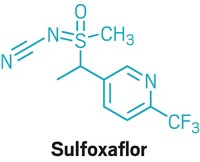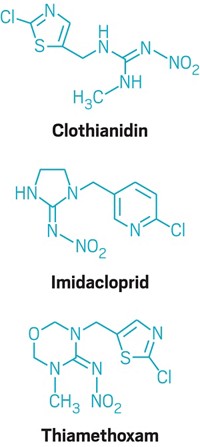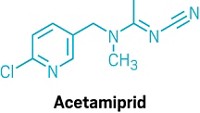Advertisement
Grab your lab coat. Let's get started
Welcome!
Welcome!
Create an account below to get 6 C&EN articles per month, receive newsletters and more - all free.
It seems this is your first time logging in online. Please enter the following information to continue.
As an ACS member you automatically get access to this site. All we need is few more details to create your reading experience.
Not you? Sign in with a different account.
Not you? Sign in with a different account.
ERROR 1
ERROR 1
ERROR 2
ERROR 2
ERROR 2
ERROR 2
ERROR 2
Password and Confirm password must match.
If you have an ACS member number, please enter it here so we can link this account to your membership. (optional)
ERROR 2
ACS values your privacy. By submitting your information, you are gaining access to C&EN and subscribing to our weekly newsletter. We use the information you provide to make your reading experience better, and we will never sell your data to third party members.
Environment
FMC Defends Carbofuran
EPA wants to ban controversial pesticide, but manufacturer says agency ignores science
by Glenn Hess
February 13, 2008
FMC Corp., manufacturer of the controversial agricultural pesticide carbofuran, and some farm-state members of Congress are urging the Environmental Protection Agency to reconsider its decision to cancel all uses of the chemical.
In January, EPA said it intends to cancel all carbofuran registrations because products containing the pesticide pose "significant risks" to human health and wildlife but provide "minimal, if any, benefit to growers."
Earlier this month, an EPA advisory panel reviewed the science supporting the agency's risk/benefit assessment. The panel is expected to issue its findings next month.
Carbofuran first came under fire in the 1980s after EPA estimated that more than a million birds were killed each year by the easily eaten granular formulation, which was banned by the agency in 1994. The liquid form has remained on the market and is still used to protect alfalfa, soybeans, and several other crops from insects.
FMC, which manufactures and sells carbofuran under the brand name Furadan, maintains that EPA has exaggerated the risks of the pesticide and ignored the best available science.
"EPA has asserted that carbofuran poses an unacceptable risk to birds and to humans, yet in order to reach these conclusions EPA must, and does, reject the results of nearly all of the scientific studies that show carbofuran's risks to be quite small for the limited uses that the registrant seeks to retain," FMC said in comments filed with the agency last month.
FMC is asking EPA to allow continued use of carbofuran on five crops—cotton, corn, potatoes, melons, and sunflowers—but to cancel its other currently approved uses. "The real-world situation with this product is that it's used in very limited situations where there is no alternative," FMC spokesman James Fitzwater tells C&EN. "It's an older product, but it's still effective against some pests where there is no alternative. That's really why we're defending this product."
A number of lawmakers from agricultural states, such as Illinois, Iowa, and Nebraska, have also urged EPA to take into account the needs of farmers who say there are no cost-effective substitutes available for carbofuran for some critical uses.
"Growers in my state have expressed to me their concern over EPA's intention [regarding carbofuran] and have brought to my attention specific benefits this product has to the agricultural economy of Iowa," Sen. Charles E. Grassley (R-Iowa) wrote in a recent letter to EPA Administrator Stephen L. Johnson.
This is the first time in 20 years that a pesticide manufacturer has fought cancellation of a registered pesticide, says Michael Fry, director of the American Bird Conservancy's pesticides and birds campaign.
"EPA's decision to ban carbofuran was a huge victory for science and the environment, but despite the overwhelming scientific evidence of carbofuran's extreme toxicity and the availability of safer alternatives, the manufacturer continues to fight all efforts to have the ban enacted," Fry remarks. "FMC needs to take the responsible course and immediately withdraw carbofuran from the market."
If EPA continues to pursue a ban on carbofuran after the advisory board issues its findings, Fitzwater says FMC will request a hearing before an administrative law judge, where the benefits and risks of the chemical will be weighed fully.





Join the conversation
Contact the reporter
Submit a Letter to the Editor for publication
Engage with us on Twitter